RACING AGAINST CANCER
- Joseph Polack
- Sep 16, 2024
- 17 min read
Between the 2024 Paris Olympics & Paralympics, I hurried from Tokyo to Stockholm to meet my cancer-stricken fellow lifeguard, Witold Montwill.
During our drive from Arlanda airport, Witold curiously asked about my 800 m Relay Team’s timing in the Pacific Rough Water Race and our mutual Japanese friends. Witold’s connections with Japan have remained strong since his latest trip to audit the Ericsson—Mitsubishi semiconductor business in Kobe. However, many years have passed.

As Witold avoided mentioning the results of his latest cancer surgery, I didn’t explore further his pending nomination for becoming a Chief Referee for the 2nd Paulo de Souza Rough Water Charity Cancer Race scheduled for the 2024/25 Winter Season in Fujisawa.
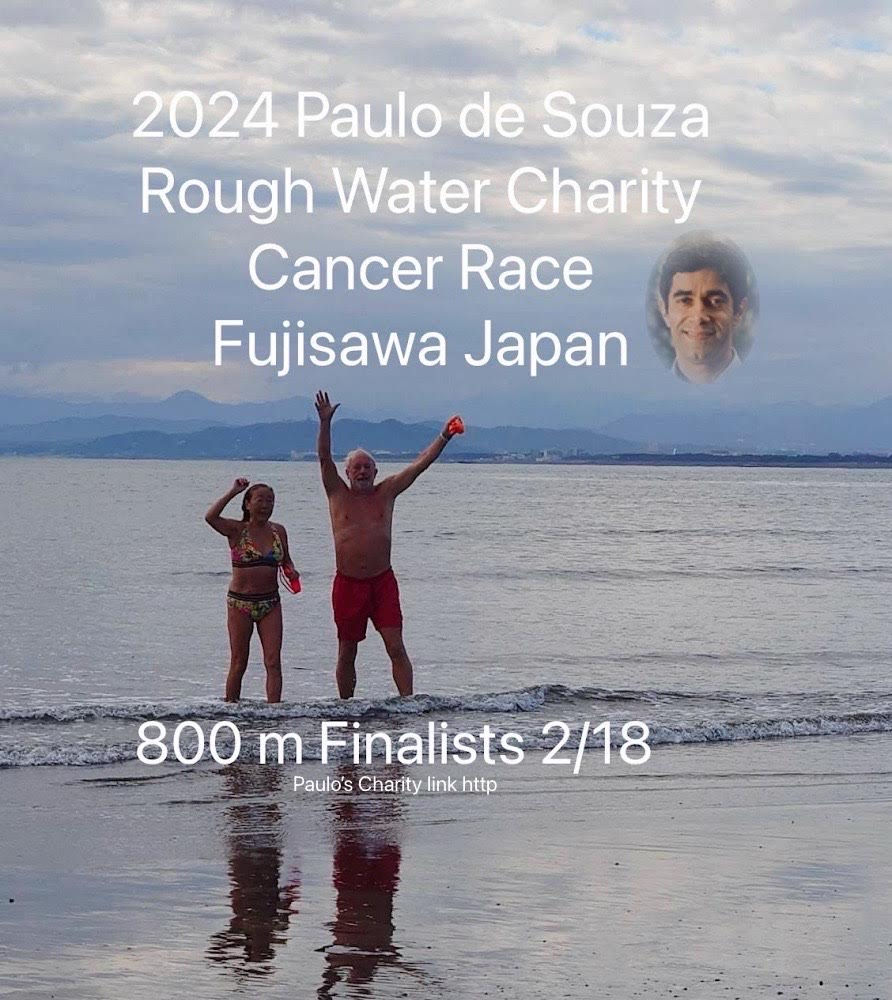
A few months before, a young Brazilian-born Oxford researcher, Paulo, began losing his battle against cancer. He asked me in his farewell email to keep our annual charity swim race named after him alive. Paulo’s last wish was to encourage the other cancer sufferers who were still racing against the time. One of them was a veteran lifesaver and my old cosmopolitan friend, Witold.

Witold’s journey to lifeguarding was as fascinating as his multicultural family’s history spanning across Poland, Lithuania, and Sweden.
It took us several weeks and many walks along his Stockholm neighborhood before Witold slowly began sharing his family’s hidden past. The past that has early shaped his dream of becoming a scout and a lifesaver was preserved in the family album.
Witold's mood kept changing while guiding me through the albums and faded newspaper clips that he had brought from Poland to his adopted country, Sweden, almost fifty years ago.
Depending on the photos and friends who were joining our conversations, we frequently switched between Polish, Swedish, English, and occasionally Russian.
The languages were affecting our memories, and the past gradually mingled with the present. After injecting himself with a newly developed Danish medication, Witold checked his blood pressure and cursed. “Slightly better, but still too high… Can’t stand it anymore! Listen!” His attention switched from the medications to the latest radio news updates. “When will that hell stop?”
“What hell are you talking about?”
“That senseless killing…” He cursed again.
Discussing the ongoing military conflicts with Witold and our closest refugee friends, who, like Tolek, were born in Russia of Polish-Ukrainian-Jewish parentage, made me realize how intertwined were our personal histories. And yet, regardless of our ethnic conflicts, our lifelong friendship and marriages across cultural boundaries seemed as natural as our children and grandchildren’s birth in three different continents.

Witold’s parents belonged to the historically distinguished Polish-Lithuanian gentry of Jundzill and Montwill. In a single day, their once comfortable life was turned upside-down by the Russian invasion of Eastern Poland (current Lithuania, Belarus, and Ukraine). In the following years, over 5 million Polish citizens were killed during WWII, and many of their orphaned children were deported to Siberia.
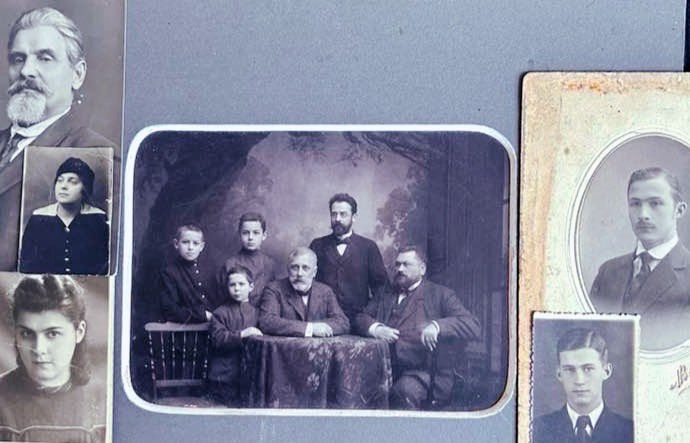
Witold’s newlywed parents (at the bottom of the memorial photo) had to survive against the odds. His father was arrested by the Russian occupiers in Vilnius and sent to a faraway coal mine under the Ural Mountains. His mother ended up as a refugee in the Western Poland, which was occupied by the Nazi Germany.
“My young then parents, who were separated by over three thousand kilometers and the Russian—German Pact, had lost contact with each other, but not hope to make it alive and get reunited one day,” Witold turned the pages. “My father organized a daring escape from the Ural coal mine by hiding in the coal-loaded train and made it against the odds over the Russian-Polish border. He found my mother among the war-displaced refugees. Isn’t it amazing?”
“Amazing?! The wars sacrificing civilians could be hardly amazing,” I said.
“Come on! I am not talking about the last century’s bloody world wars… Sweden hasn’t experienced war for over two hundred years. And yet, in 2024, they are getting prepared for any emergency that may come again from Russia… Let’s go!” He suddenly shut down the album, and his attention focused again on the latest Swedish Radio News reporting deadly shootings among the local street gangs.
“Even the security alert was heightened again; someone had thrown explosives yesterday to a shop a thirty-minute drive from here, and today another street shooting!” His voice turned impatient, “We need to get out of here before it will be too late…”
“Too late for what?”
“For getting fresh air before the rain will catch up with us at the lake. Why are you so bloody slow!” His irritation kept growing. I was still wondering if his mood swings were caused by the battery of medications he was consuming daily or by the media alerts. “Did you hear what I said!? We are running short of time! What are you looking for?!”
“For my swimming trunks and some cold beer cans I had stored in your fridge.”
“How many times have I already warned you that swimming was made illegal in our Solna lake since the last time you visited me… and so is the beer drinking forbidden along the waterfront. Hurry!”
It took us fifteen minutes before we reached the lake. “Isn’t it great!? The sun is back.” Witold put dark glasses on and turned his head from the migrant water birds to the lifebuoy equipment and to another group of multiethnic joggers crossing our path. “Isn’t our Solna lake beautiful?!”

“Sure, it is! But isn’t it odd that though it’s legally forbidden to swim, you have rescue gear placed every few hundred meters,” I teased Witold.
“There is nothing odd in it. Legal or illegal, anyone is expected to give a helping hand in an emergency. 7/24! Anyone and anytime, a trained lifesaver or just any passerby who may hear a cry for help… Look!”
At the third rescue post, Witold pointed at the group of runners trying to avoid a family of stranded ducklings.
“Could you guess who is a licensed lifesaver or who isn’t? It doesn’t matter who will throw a lifesaving link to a drowning guy. At first, I couldn’t get used to the Swedish way of entrusting individuals to make their own decisions on the spot.”

“In my early years of attending our scouts' training camps in Poland we were instructed to always follow the chain of command. The senior scout was authorized to be in command of any rescue operations during our summer camps. I was early fascinated by lifeguards’ ability to make a difference between life and death…”
“Was it your father’s daring survival story that made you join lifesavers in high school?”
“No! My father avoided talking about the past dangers that our Polish Scouting Association and lifesaving volunteer groups had to go through during the wartime…”
Witold’s voice was overlapped by a group of noisy teenagers trying to catch a couple of the lost on the shore ducklings. I couldn’t figure out why they were trying to push away the ducklings back to the water until I heard their nervously quaking mother duck.
Guessing from the teenagers’ darkish faces and accented Swedish, they might have recently found refuge in Sweden.
“Am wondering what war these kids and their families had fled from,” I asked Witold.
“How would I know? There are tens of thousands of war refugees trying to get asylum in Sweden each year. It seems that there is hardly a single day without the war going on somewhere in the world…”
Witold’s words revived my memories of my own.
My mind journeyed back in time to my own boyhood in a postwar orphanage in the Polish Tatra Mountains. The orphanage was then accepting only elementary school kids. However, due to the war, some of my fellow inmates were delayed by six years. Among them were former scouts who had fought with arms in the tragic Warsaw Uprising, where hundreds of thousands of civilians had lost their lives; I didn’t know it then. There were stories that we had only shared in whispers.
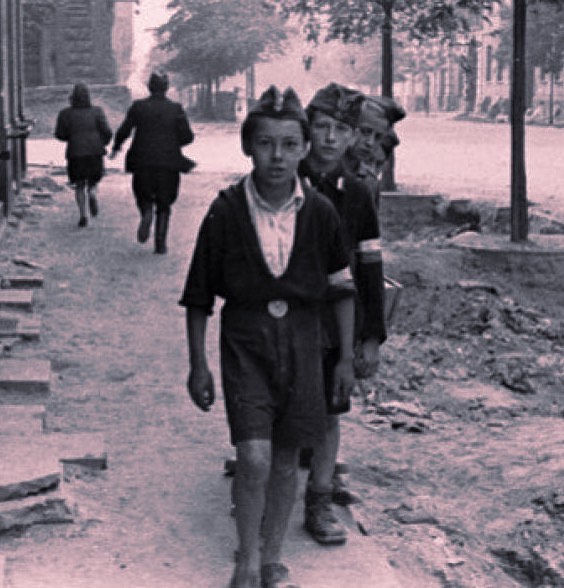
“Why did your father keep you away from these wartime stories about the Polish child soldiers wearing the scout uniforms ?” I asked Witold during our walk through the heavily policed center of Stockholm.
“Maybe he didn’t want to discourage me by recalling how many Warsaw scouts had perished in WWII. Or maybe he wanted me to figure out how to avoid the hidden danger on my own. When I entered elementary school, Warsaw was still slowly rebuilding from the ruins, and undetected explosives were uncovered daily. The summer camps organized by our Warsaw Scouting Association gathered all kinds of kids. And at the campfire, I had learned a little more from the older scouts about their war memories that we weren’t taught in our state school. Odd times, we were growing up, didn’t we?”
I said nothing.
My mind kept moving back and forth. Witold’s words revived familiar sounds. I could hear my father’s whispers, but I couldn’t understand the meaning. I was five when my father died. He was 35. It was in the Stalin time. A bloody history of the teenage Boy Scouts called “Gray Ranks,” who had lost their lives as urban resistance fighters, was passed in whispers from generation to generation. Their whispers were mingling with my Warsaw relatives' wartime stories that I had preserved in my memory.
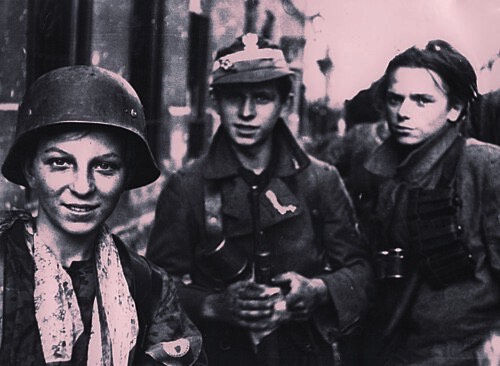
A sudden alarming sound interfered with my memory about the untrained scouts battling the enemy forces in the tragic Warsaw Uprising. “What’s that?” I asked Witold.
“Oh, it’s just my software reminder that we are doing well enough!”
He checked his beaming e-watch, “We should be able to complete several thousand steps before getting back home. Anyhow, what did we talk about?”
“About the things you have remembered from your lifesaving summer camps. Something about being ready to deal with the hidden danger in...”
“In wartime and peacetime, the lifesaving may require different skills.” Witold avoided stepping over a duck resting in the sun.
“Like what?” I asked him.
“Like looking for a snake hiding in the tent. Or tracing rough rocks hiding under the surface of our forest lake before a younger scout may break his neck in the head-first jump. Or checking for the fishing hooks and other underwater traps that our Polish lakes were infested within my school times.”
Witold’s voice turned from mentoring to nostalgia. “My summer duties were simple: to help set up a little wooden pier, delineate a safe bathing area with buoys, watch over the safety of my bathing fellow scouts… and then try to be ready for a real challenge!”
“Challenging, what?”
“The tough licensing exam ahead of time.”

“Through years of summer scout training, my swimming and lifesaving skills had become good enough to apply for the state examination… but I was turned down. At 14, I was still two years short of officially passing a competitive Lifesaving License. Yet, I was still lucky!”
“Lucky?”
“Yup! Encouraged by my scout leader, who was also an experienced lifesaving instructor, I had continued to prepare under his individual mentoring… even after the official summer camp season was over.”
“I was fortunate to meet enthusiastic instructors just at the right time.
Our newly centralized Voluntary Water Rescue Service (WOPR) was under strict state control. WOPR wasn’t then affiliated with any international federation of lifesavers. So the legal rules were made by the state, and the communist state in the sixties could be tough!”
“Yet, our slowly growing lifesaving community began to attract passionate instructors from different walks of life and of different ages. Some were my father’s age, and the others were older. What they had in common was that they all were the war survivors. Some of them may have lost their own kids. Maybe that was why they were eager to offer their private time to help young swimmers, like I was then, to follow our dreams of becoming fully trained lifesavers. I didn’t know then why.”
“Why, what?”
“Why these men and women in my parent's age who had survived both Nazism and Stalinism still cared about some little scout’s lifesaving dream,” Witold recovered among his old treasures a fading
little registration book. “Anyhow, at the age of 16, I had passed all medical and physical tests to become a junior lifesaver in the first grade. Then, at the age of 19, I had advanced to the second grade, and in the meanwhile, the state authorities introduced the official ID book with some a dozen of stamped pages to verify our activities as licensed lifesavers. Look! It’s me!”

” What is the difference between these two lifesaving grades?” I asked Witold.
“The higher grade was necessary to seek a part-time job. At that time, I became a student of electronics at Warsaw University of Technology, and Lifesaving ID allowed me to get a part-time job as a licensed lifesaver.”
“But Warsaw is several hundred kilometers away from the seaside,” I joked.
“It doesn’t matter if one drowns in the Baltic Sea or in our Warsaw Vistula River, or on your Japanese side of the Pacific!” Witold turned serious again. “Death is a death, wherever it catches up with us.”

“Do you have similar Permanent Rescue Signs in your Japanese neighborhood?” Witold pointed at the Swedish sign.
“Yup! But when the Japanese two months-long Official Summer Season is over, most of the Lifesaving Equipment is gone, and the temporary Lifeguarding posts must be removed in accordance with the law.”
“So who helps the folks during the remaining ten months?”
“Well, the foreign community volunteers had expanded our Henna Gaijin Swimming Club’s HGSC activities to watch over off-season swimmers.”

“But are your HGSC trained enough to replace the regular Japanese Lifesavers?”
“We don’t try to replace them. Actually, many of our HGSC members are also associated members of the Japanese Lifesaving Teams during the summer season, and competitive Rough Water Swimmers in the Japan Power Sports Series…”

“Well, guessing from your latest Rough Water Race your 800-meter Relay Team could be improved before your coming Winter Charity Swim to commemorate your late Brazilian friend’s battle against cancer…”
“Paulo was much too young to go… He left behind two teenage daughters and a lot of hope for the cancer-battling-folks. That’s why the members of our Fujisawa Relay Team who are also fighting cancer want you to join our 2nd Paulo de Souza Cancer Charity Pacific Swim Race.”
“Afraid it may be already a bit too late… after my earlier Heart Bypass Operation and the latest Cancer Surgery, I am hardly eligible for any rough water swim,” Witold pointed at his daily portion of medications.”
“Well, our Relay Team’s associate member, Guillermo, hasn’t given up his fight against the cancer.”
“Is it the same Guillermo who had appeared in your 2021 Tokyo Olympic blog and then…” Witold, who has been following my online chapters for several years tried to recall Guillermo from his fading memory. “Since I was prescribed stronger painkillers, I have trouble to remember… What did you say is his name? Paulo?! Sorry, I mean Guillermo,” Witold corrected himself.
“Yup! Guillermo! The same guy you had read about earlier, a 64 year old Fujisawa-based Peruvian lifesaver and a father of three bicultural adult children. We worked together at the Tokyo Olympics’ Water Sports Volunteer Security Team.”
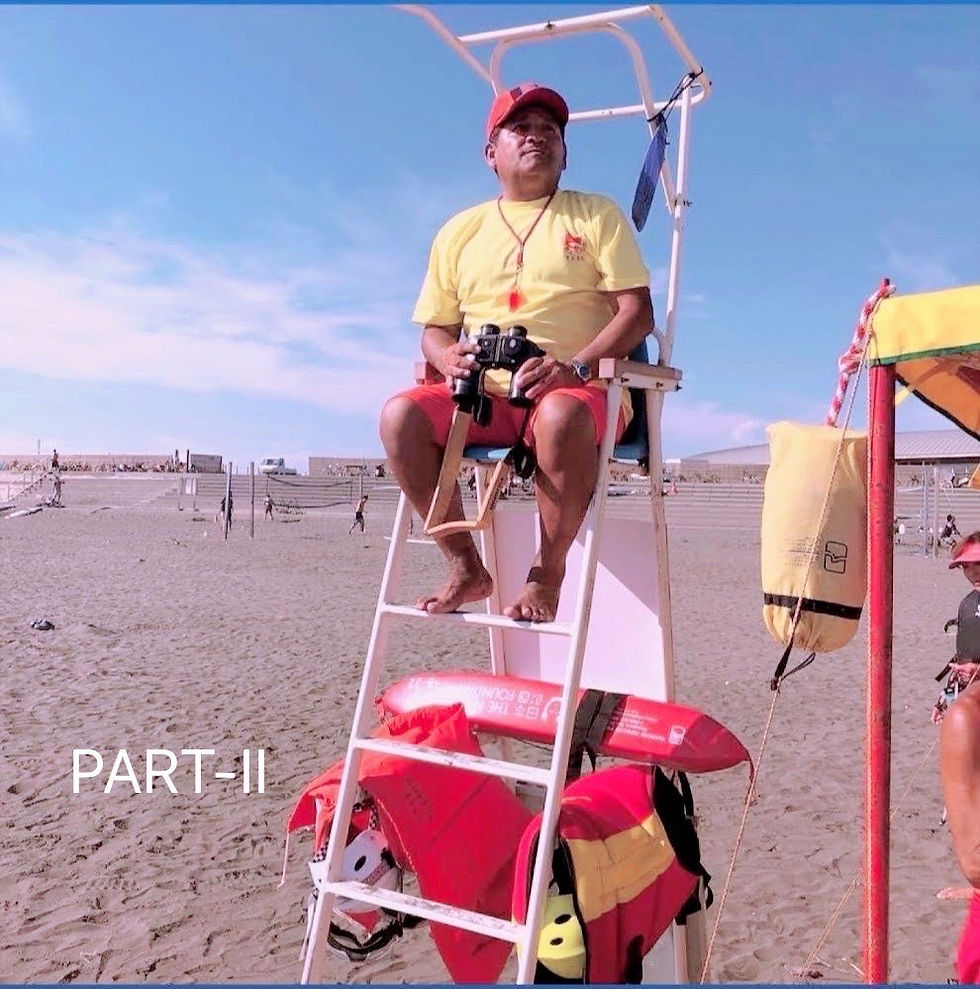
When Guillermo’s cancer began to spread, he had to reduce his summer lifesaving duties further.
One day I bumped into his wife Patricia. She told me Guillermo was slowly losing his strength. His muscles were getting weaker, he couldn’t work full time anymore, but she said they were luckier than the other foreign cancer patients who couldn’t make the ends meet.
“Don’t they have a National Insurance over there in Japan?” Witold interrupted my story.
“Japanese National Insurance is good, but not as good as the Swedish welfare system… A cancer or any chronic illness may make some families to go under!”
“So how did your Peruvian friend keep still his head above the water?”
“Guillermo’s wife Patricia assured me during one of our beach charity events that she is strong enough to support her husband’s survival fight. She said she has a steady job, and could work a double shift until Guillermo would secure an extra job as a part-time driver. Patricia was sure Guillermo will gradually recover his strength and they will make it through one way or another.”
“Sorry,” Witold responded in Russian to his
beeping phone. After several minutes of following his conversation with one of his many Russian friends, my mind switched back to my Japanese memories.
“With his spreading cancer, Guillermo seemed to have missed the ocean even more,” I recalled Patricia’s sad smile. “Without being closer to the ocean Guillermo felt lonely. And being lonely wouldn’t help to get one’s life together…” Patricia switched from her Spanish-Japanese to her Spanish-English and then Japanese-Spanish again “Guillermo needed a kick!”
“What kick?” I had always problems with Patricia’s knack for using several languages in just a couple of sentences. “A kick?!”
“Yes! Any kick that could help him to get back to his first love… the ocean. Since we both were divorced and had remarried twelve years ago, Guillermo kept changing our apartments to get closer to the sound of waves. I couldn’t hear the waves, but he insisted that he could! He believed in a healing power of the ocean…”
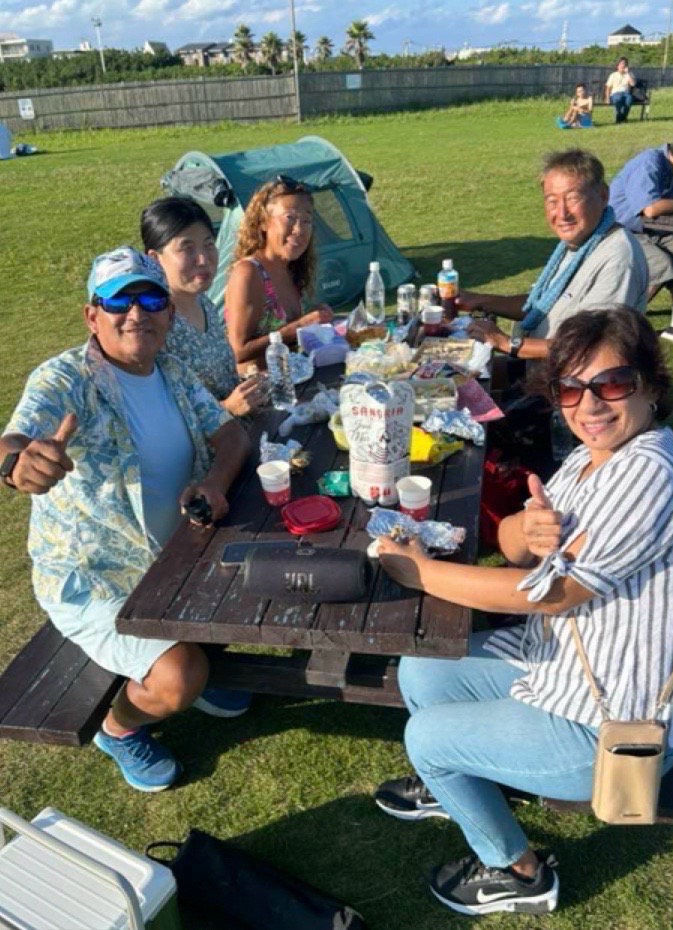
I remember it was a few weeks later when I bumped into Guillermo. He was biking along the Fujisawa beach. I mentioned Paulo's charity race. And gradually whenever we got together, Paulo and the coming race had become part of our casual conversations.
“Sorry,” I heard a Polish voice. It was Witold.
“Sometimes my phone keeps silent for hours, and the other times, one call after another. So what did you say?”
“About what?”
“About keeping one’s head above the waves… Sorry again,” Witold silenced his noisy phone. “So how was that charity race?”
“In an odd way, while Paulo was losing his race against the cancer, his fighting spirit was reviving Guillermo’s determination to never give up.”
“Had Paulo and Guillermo ever learned to know each other?” Witold asked.
“Except that both happened to be of South American heritage and made their homes some 10.000 km away from their birth countries, they had hardly anything in common except battling cancer.”
“Well,” Witold remained skeptical that there was any spiritual connection linking us together across three continents. “How long did Guillermo serve as a Licensed Lifesaver before he was diagnosed with cancer?”

“Guillermo was a twenty-year-old police rookie in Lima when he passed his Lifesaving License in 1978. In Peru, the Lifesavers belong to the Lifeguard-Rescuers Association of Peru, that is a part of the National Police, and being a police officer in the 1980s was tough. Guillermo told me that the leftwing terrorists had organized urban death squads, and many of his colleagues lost their lives…”

“But how did Guillermo end as a Lifesaver in Japan?”
“He married a second-generation Peruvian Japanese, and in the early 1990s, he moved with his wife and two small kids to Japan, where his youngest son was born; Japan was then welcoming Peruvian emigrants…”
“Why?”
“I don’t know. Maybe because the Japanese economy needed guest workers, or maybe because a son of Japanese immigrants, Alberto Fujimori, was elected as Peru’s President in the 1990s. Anyhow, Guillermo had left the Peru National Police and settled in Japan thirty years ago.”
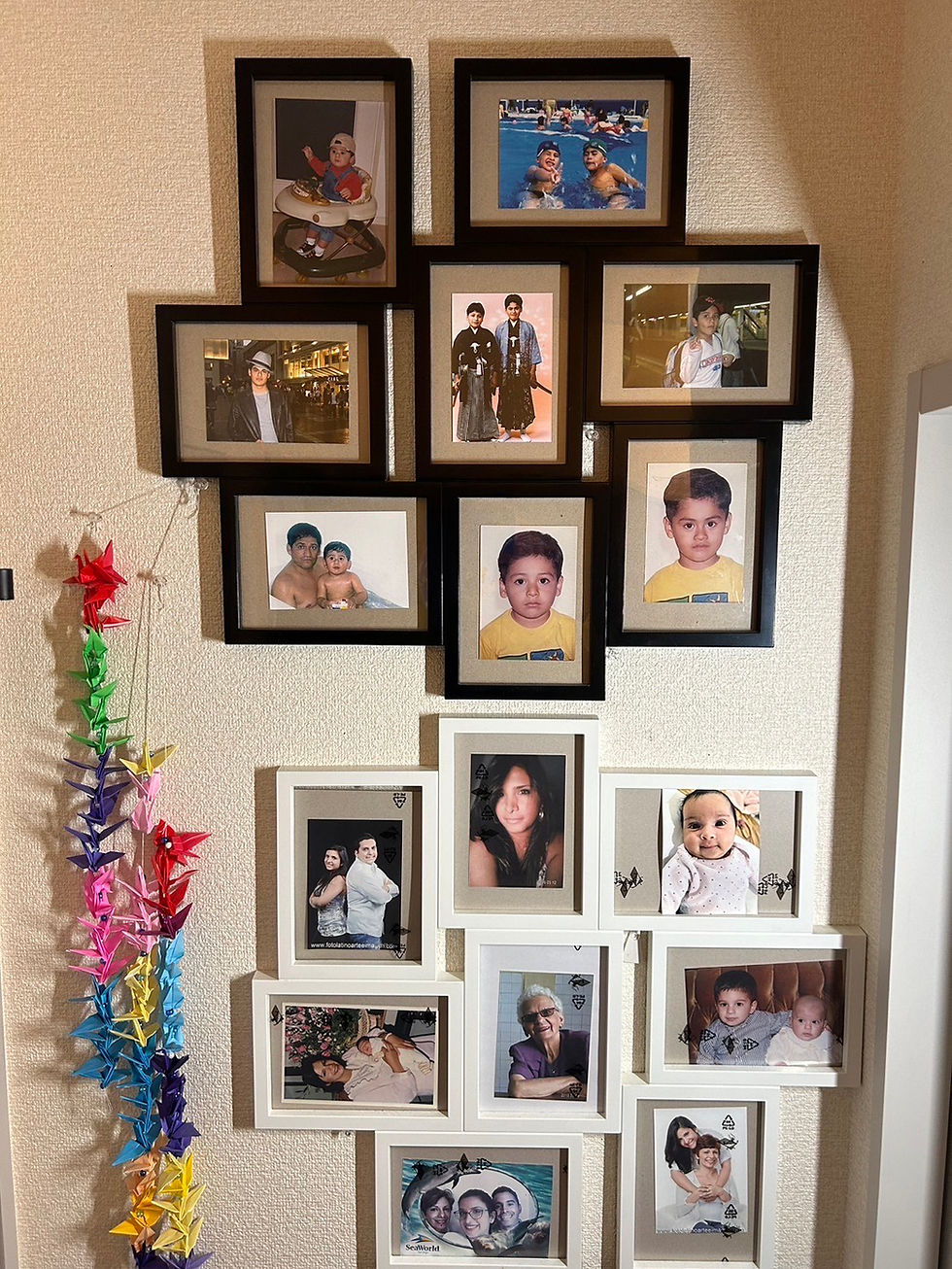
“But how did he support his big family?” Witold asked.
“At first the life was good for him in his new country. His knowledge of Japanese and fluency in several other languages helped him to start a little consulting business for South American immigrants.”

“…Then the Japanese economy slowed, and so did Guillermo’s financial consulting business. His Japanese-Peruvian wife asked for divorce and took their kids away… Twelve years later Guillermo remarried another Peruvian, Patricia, and brought her to his adopted country, Japan…”
“Whatever!” Witold turned sarcastic. “You had lost me already with all these South American connections… Anyhow, how did the two of you become friends?”
“Since serving together with Guillermo as the volunteer lifesavers in the Tokyo Olympics Water Sports Security Team, we continued to collaborate at our neighborhood’s SURF90 Lifesavers Teams. Then, one day, Guillermo had disappeared from the beach for a longer time.”
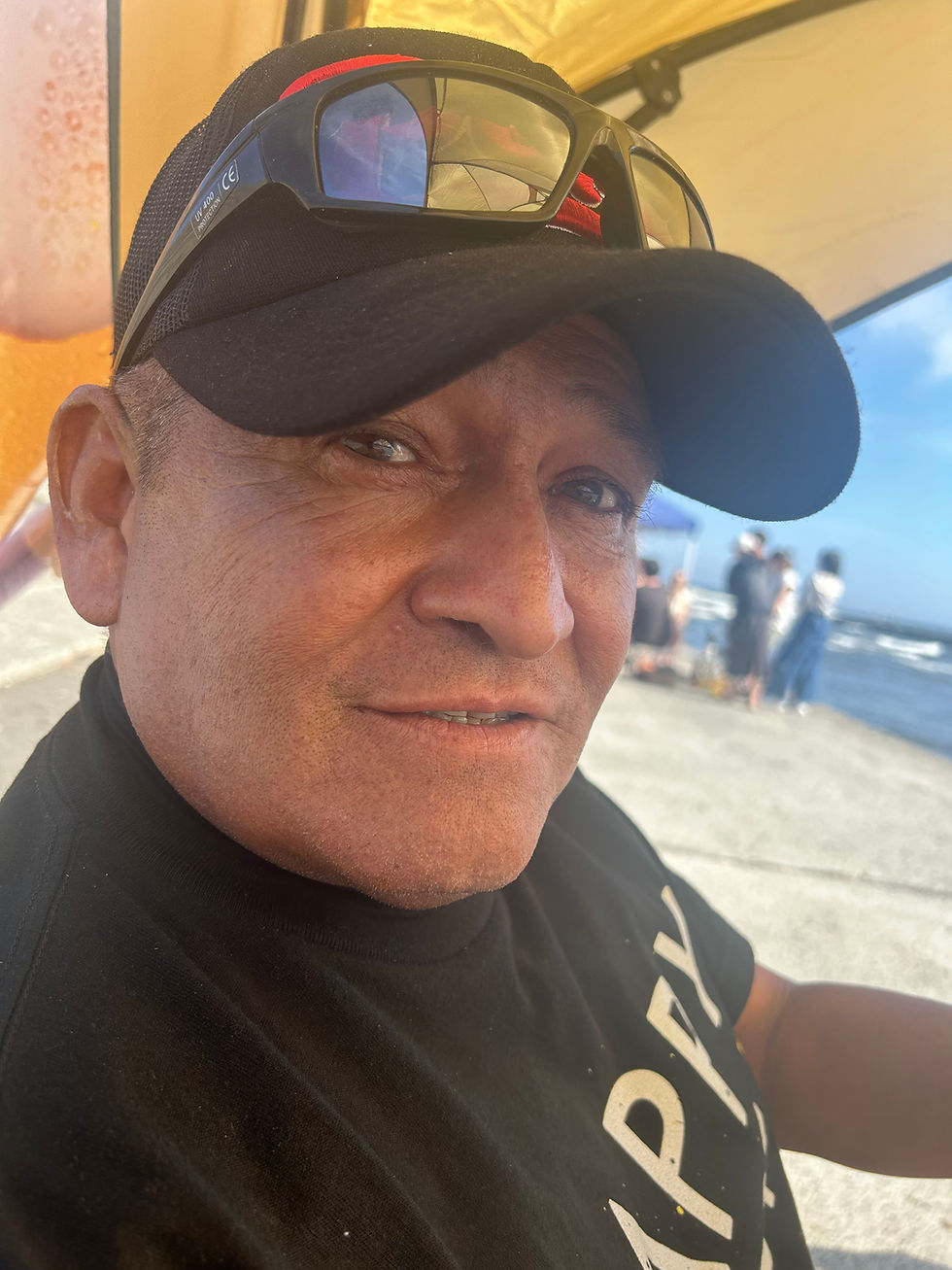
“When we bumped into each other again during my winter training, Guillermo didn’t tell me that he was undergoing another post-surgery chemotherapy treatment. He promised to join our Winter Charity Race for Paulo, who was still fighting for his life.”
In the following months, Guillermo was in and out of hospital. Paulo’s terminal cancer was progressing rapidly, and there was a need for more funds.

Guillermo, Phil, Atsuko, Jun, Kei, Patrik, and the other folks associated with our Henna Gaijin Swimming Club’s branches in Kamakura and Fujisawa kept organizing more rough water races and charity events to contribute funds for Paulo’s family support.
“A few weeks later, when we had already reached our goal of contributing 250£ for Paulo’s support fund, Guillermo called me from Fujisawa Hospital. He apologized for being unable to join our Winter Race. He was awaiting surgery. He asked how Paulo was doing. I didn’t know what to say.”
“There are times it is better to say nothing,” Witold turned his head away. “And what happened to Guillermo?”
“It was already summer when I shared with Guillermo the sad news that Paulo lost his race against cancer on June 17, 2024. After learning about Paulo’s passing away, Guillermo joined our Rough Water Challenge as our Team Manager on July 6, 2024.”

“How could Guillermo manage your team of aging seniors while he was in and out of hospital and still undergoing chemotherapy?” Witold was getting increasingly astonished.
“I don’t know how! Yet some of our local Japanese lifesavers thought that behind Guillermo’s renewed strength may be Paulo’s living spirit. Our Annual Rough Water Race that was scheduled long in advance took place just a day after Paulo’s funeral on the other side of our Eurasian continent. Paulo was cremated on July 5th 2024 and
Guillermo managed our race on July 6th, 2024. Isn’t it striking? Less than twenty four hours in between…”
“Well, our life is made of endless
coincidences,” Witold said. “Statistically it may be possible.”
“Yet many of my Japanese neighbors
believe that summer is the time when spirits return to earth to take care of the living ones. That’s why Paulo could join our race for cancer…”
Witold said nothing.
“Anyhow, you don’t need to come to Japan as a Polish Lithuanian Swedish swimmer. Didn’t I tell you, Witold, we need a Chief Referee for Paulo’s Memorial Race? And the only problem is that while our Henna Gaijin Swimming Club could provide you with a homestay, we couldn’t afford to cover your ticket from Stockholm to Tokyo. What do you say, Witold?”

Witold looked silently at me, then coughed. “…I may need to ask my son Jan for advice. Jan and his Swedish wife had currently holidayed in Tokyo, and my last business trip to Kobe was in my healthier years.”
“Well, you’re almost as healthy as Guillermo and the rest of our Henna Gaijin Swimming Club’s charity volunteers. In any case, that’s for you,” I pushed across the table two ten thousand yen banknotes.
“What the hell is this?!” Witold pushed the bills back.
“In case there will be another typhoon and I won’t be able to pick you up on time at the Tokyo airport you may need to stay overnight somewhere.”
“What the hell are you talking about?! Typhoon or no typhoon, I didn’t decide when, if at all, I may be coming…”
“If I don’t come, just pass over the money to some other EU volunteers who could help us expand our Pacific Cancer Charity Race in memory of Paulo…”
“But I have never met Paulo, and besides…”
“Here is Paulo,” I switched on my iPhone’s photos and pushed over the board to Witold. “He used to teach business studies in Brazil; then he changed his mind and moved with his young family to Oxford to specialize in our environmental survival.”

“Paulo was then still healthy and full of dreams about bringing us all closer to nature again. Then, one day, he learned that he was losing his race against cancer, but he still wanted us to keep our cancer charity race alive. Don’t let Paulo’s fighting spirit die, Witold. We need you in our race to battle the cancer…”
If Witold could hear me, I wasn’t certain. His attention was already switched from my iPhone to a dozen of his daily medications that he was trying to squeeze into a plastic container. Witold was preparing for two operations scheduled to be performed this summer. He suggested me to revisit a more swimming-friendly side of the Stockholm-archipelago for the following week.
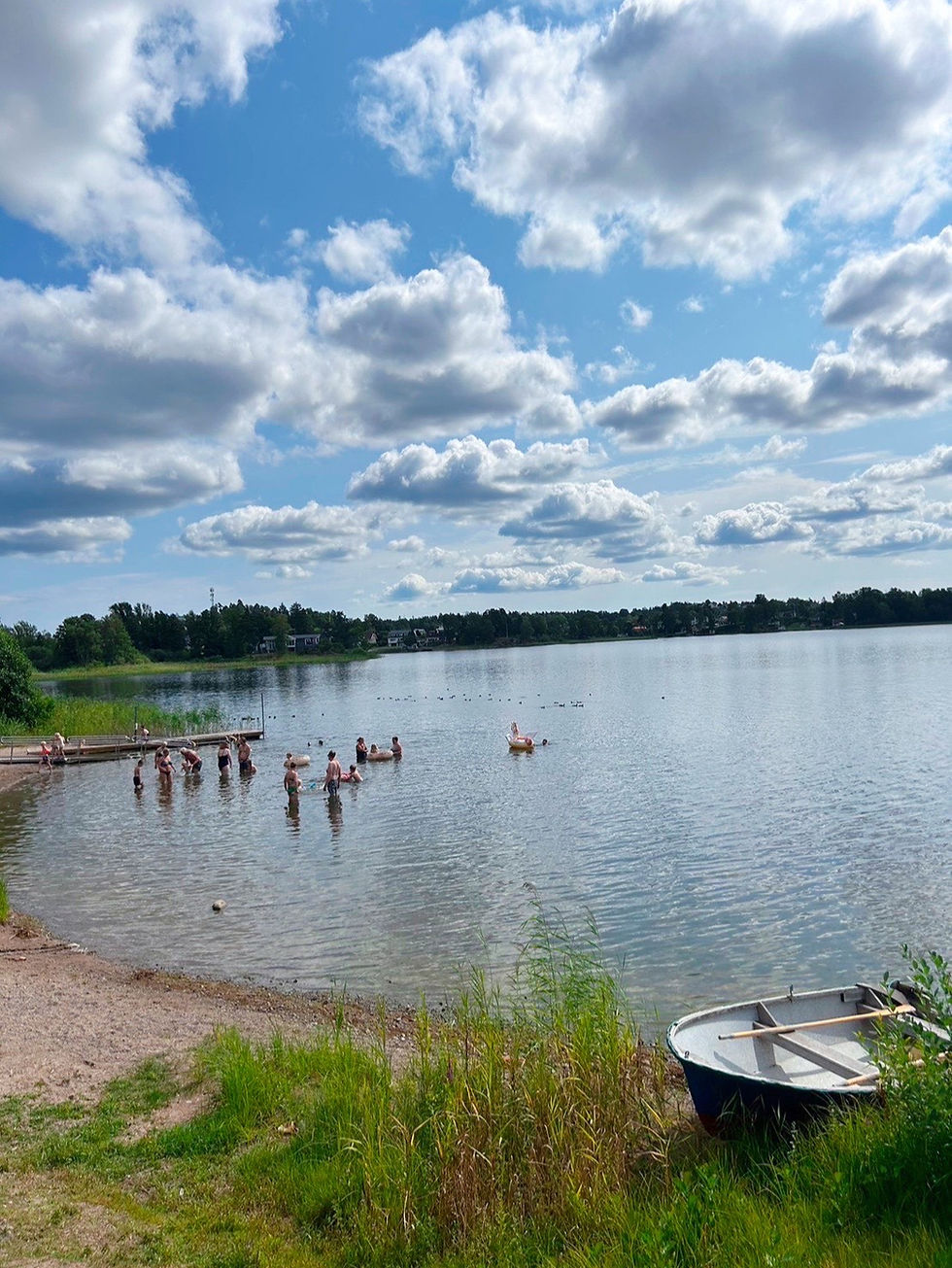
When I returned from the swimming-
friendly-forest-lake a week later, Witold seemed slightly more energized.
During our lunch at the nearby sushi restaurant ran by a Chinese family, we exchanged anecdotes about our multicultural kids’ childhood adventures and chatted about lifesavers’ mission of bridging cultural boundaries.

The following day Witold felt strong enough for a longer walk around the Solna lake.
At first we walked in silence. Then we
returned to our usual chat about his beautiful neighborhood lake that has become a reserve for the migrant birds.
A few days later Witold invited me for a family lunch with his two beloved Swedish-born offspring: his son Jan and his grandson William. We rounded our lunch with talk about our mutual friend, a young Japanese intern, Keitaro.
Several years earlier when Keitaro came to Sweden as an unpaid intern for Witold’s former employer Ericsson Corp, Witold offered him a free of charge lodging and food.
“As Jan moved together with his future wife, Keitaro could stay in Jan’s old room… then a few years later Jan & Keitaro got together in Tokyo less than a year before my grandson William was born… What a small world. Stockholm and Tokyo are getting closer with each passing year…”
“Because of the guys like you, Witold,” I said.
“Give me a break!” Though his voice sounded rough, his eyes, smiled. “Keitaro loved my Swedish fish sup. He wanted to eat it even for breakfast… How is he doing?”
“Keitaro is doing fine. He will be happy to see you soon, Witold.”
“Is Keitaro going to visit Sweden again?”
“This time it’s your turn to revisit Japan after so many years,” I reminded Witold: “Guillermo and our Henna Gaijin Swimming Club’s folks are waiting for your arrival in Japan to join Paulo’s memorial race, Witold. Do you hear me?”
Instead of replying, Witold searched for his sun glasses. Whenever he wanted to hide his pain, he covered his eyes with dark glasses, and tried to sound unconcerned.
Though his rapidly weakening eyesight required another surgery, Witold wanted to walk me, like many times before, to a nearby Solna Station and make sure I wouldn’t miss the connecting train.
I wasn’t surprised when Witold’s usual firm handshake was followed by his Polish-accented “Sayonara”.
“Sayonara, Witold. Do zobaczenia w Tokio”
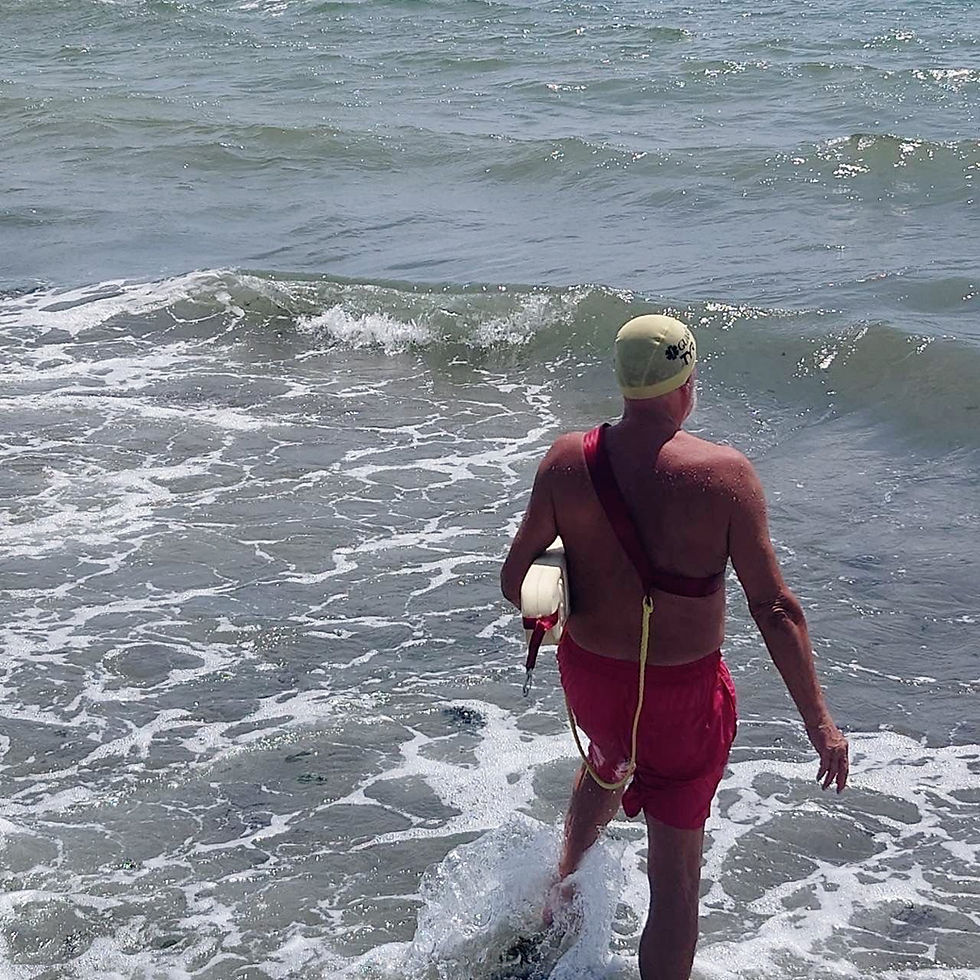
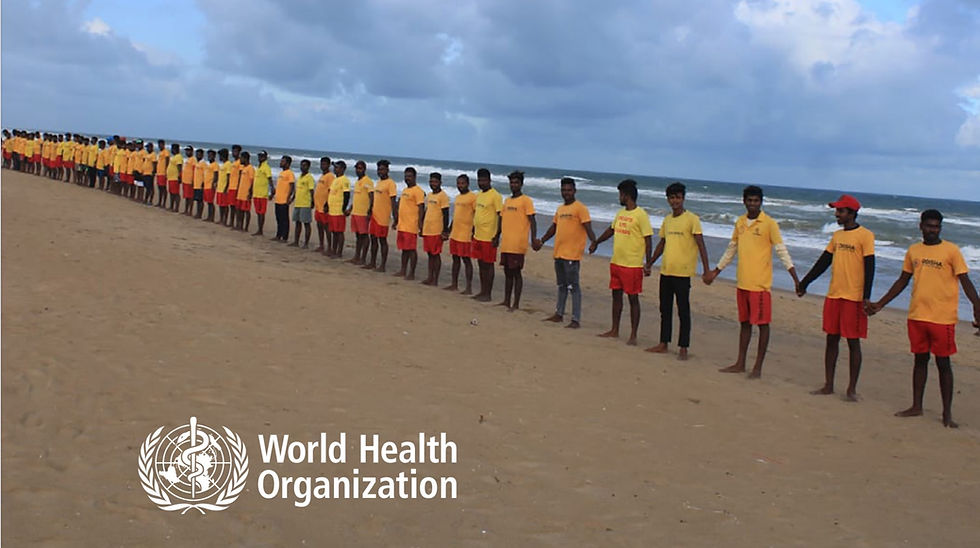



Hello Marek, I had the opportunity to read your blog Racing Against Cancer and despite it being a very painful and sad topic, I am left with your spirit of highlighting the courageous human being who lives and fights above his sorrows and sufferings. Good people transcend through their actions and how friends manage to transmit through their words a piece of their lives and on this occasion you have captured it very well and with much feeling.
I must also thank you for mentioning with such appreciation my husband Guillermo Sotelo, highlighting his fight with this difficult disease but above all for his warrior spirit to face it.
Thank you dear friend Marek
Dear Merck, after my return from my trip to Peru where I was able to meet my family and some great friends, I had to deal with the issue of my health here in Fujisawa and undergoing several medical exams. It is for this reason that I have just been able to read your Blog "RACING AGAINST CANCER" and carefully and the first thing that occurs to me to tell you is that I found the topic you refer to extremely important and thoughtful. I can't stop thanking you for such undeserved words towards me. I can only thank you for your friendship and unconditional help.
Your forever friend Guillermo
Joseph Polack covers a range of topics in his latest blog, geographically including Sweden where he immigrated as a student from his native Poland and Japan where he now lives. Swimming, scouting and cancer are other prominent topics. As I am Chair for Life of the Henna Gaijin Swimming Club, the blogs' coverage of this organization is greatly appreciated. Amongst the numerous photos are touching black and white shots of some of the young Polish Boy Scouts who fought and often died in the Warsaw Uprising against World War II Nazi control of the city.
Querido Marek
Quiero felicitarte de todo corazón por tu maravilloso blog. Tus historias verídicas sobre las personas que has conocido a lo largo de los años en la playa de Katase Nishihama, son verdaderamente inspiradoras. Como salvavidas, no solo proteges vidas, sino que también capturas la esencia de cada individuo con una sensibilidad y profundidad que conmueven a todos tus lectores.
Cada relato es un testimonio de tu habilidad para ver más allá de lo superficial y encontrar la belleza en las experiencias humanas. Gracias por compartir estas historias con nosotros y por recordarnos la importancia de la empatía y la conexión humana.
Sigue escribiendo y transportándonos a ese rincón especial de Japón donde las olas del mar y las…
ウィトルド·ギレルモ·パウロの日本語版を読んで感動しました。
私は幸運にも、もう6年以上もあなたの日本人の隣人であり友人でいられることを嬉しく思っています。ギレルモは、私が藤沢で公認ライフガードとして働いていたときに友人になった人の一人です。
私はウィトルドにもパウロにも会ったことはありませんが、あなたのブログ「Racing Against Cancer」の日本語版と英語版を読んで彼らに親しみを感じます。
ウィトルドの健康がスウェーデンで快復することを願っています。 私たちの日本の隣人は、あなたのポーランド·リトアニア·スウェーデンの救命士の友人ウィトルドを歓迎します。 彼が第2回Paulo de Sousa Memorial Race Against Cancerの外国人主審となれば私たちのビーチコミュニティが外国人ライフガードに対してよりオープンになる助けとなるかもしれません。
ブログの最後までパウロに関する3つのリンクを控えていただきありがとうございます。 それらは私を感動させました。 パウロは家族をとても愛していました。 彼の国際的な友人たちもまた、彼の家族をサポートするために700以上の寄付をする事をもって、彼をとても愛していました。
https://www.gofundme.com/f/paulos-terminal-cancer
あなたのパウロの人生における他の2つのリンクは、私をより幸せにしてくれました。 パウロは、同僚から尊敬されるオープンマインドの環境研究者であるだけでなく
https://www.geog.ox.ac.uk/news/memoriam-paulo-de-souza
彼はまた、人生を満喫する楽しさを愛する男性でした。 彼の旧友ドナルドのパウロの葬儀でのスピーチから、私は一人の人間としてパウロの多くの側面について学びました。
パウロはグライダーのパイロットであり、演技映画のエキストラとして「ジュラシック·パーク」の映画で恐竜から脱出し、コンテストの金融エッセイでマセラティの車を獲得したこともあります。
https://www.youtube.com/live/tTCpwIxFyZo?si=ADtb_rijlKpR1V-o (18:30-25:40 ドナルドのパウロの思い出)
パウロの精神を私たちの湘南地区に結び付けてくれてありがとうございます。 日本では、毎年夏になると死者の霊がこちら側に訪れると信じられています。 https://en.wikipedia.org/wiki/Obon
私たちはこの祭事を「お盆」と呼びます。 このようにしてパウロの霊は常に私たちとともに生きているのです。
石橋愛子